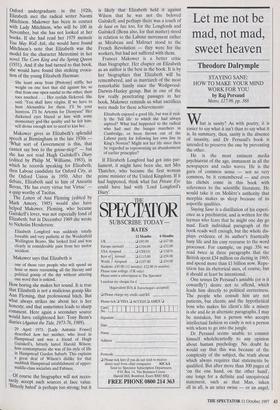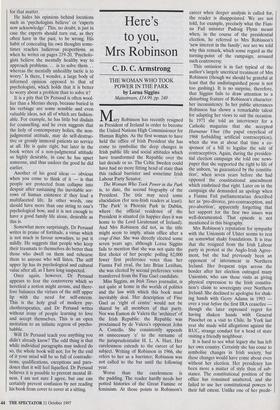Let me not be mad, not mad, sweet heaven
Theodore Dalrymple
STAYING SANE: HOW TO MAKE YOUR MIND WORK FOR YOU by Raj Persaud Metro, £17.99, pp. 388 hat is sanity? As with poetry, it is easier to say what it isn't than to say what it is. In summary, then, sanity is the absence of insanity, and Dr Persaud's book is intended to preserve the one by preventing the other.
He is the most eminent media psychiatrist of the age, immanent in all the newspapers and radio waves. He is the guru of common sense — not so very common, be it remembered — and even his clichés come in this book with references to the scientific literature. He would take it on Moliere's authority that morphia makes us sleep because of its soporific qualities.
Staying Sane is a distillation of his experi- ence as a psychiatrist, and is written for the layman who fears that he might one day go mad. Each individual paragraph of the book reads well enough, but the whole dis- plays evidence of its author's frantically busy life and his easy recourse to the word processor. For example, on page 356 we read twice in three paragraphs that the British spent £34 million on dieting in 1969, and spend more than 11 billion now. Repe- tition has its rhetorical uses, of course, but it should at least be intentional.
One senses Dr Persaud's amiable (or is it cowardly?) desire not to offend, which leads him directly to political correctness. The people who consult him are not patients, but clients; and the hypothetical boss who makes his client's life a misery is she and he in alternate paragraphs. I may be mistaken, but a person who accepts intellectual fashion so easily is not a person with whom to go into the jungle.
Dr Persaud seems unable to commit himself wholeheartedly to any opinion about human psychology. No doubt he would say that this was because of the complexity of the subject, the truth about which always requires that statements be qualified. But after more than 300 pages of 'on the one hand, on the other hand', one longs for a definite and unequivocal statement, such as that Man, taken all in all, is an utter swine — or an angel, for that matter.
He hides his opinions behind locutions such as 'psychologists believe' or 'experts now acknowledge'. This, no doubt, is just in case the experts should turn out, as they often have in the past, to be wrong. His habit of concealing his own thoughts some- times reaches ludicrous proportions, as when he writes on pages 219-20, 'Psycholo- gists believe the mentally healthy way to approach problems. . . is to solve them. . . whereas the mentally unhealthy tactic is to worry.' Is there, I wonder, a large body of informed opinion opposed to that of psychologists, which holds that it is better to worry about a problem than to solve it?
It is a pity that Dr Persaud is often wool- lier than a Merino sheep, because buried in his verbiage are some sensible and even valuable ideas, not all of which are fashion- able. For example, he has little but disdain for counselling, and he even suggests that the holy of contemporary holies, the non- judgmental attitude, may do self-destruc- tive or grossly immoral patients no service at all. He is quite right, but later in the book writes of a non-judgmental attitude as highly desirable, in case he has upset someone, and thus undoes the good he did earlier.
Another of his good ideas — obvious when you come to think of it — is that people are protected from collapse into despair after sustaining the inevitable sor- rows of human existence if they lead a multifaceted life. In other words, one should have more than one string to one's psychological bow, and it is not enough to have a good family life alone, desirable as this is.
Somewhat more surprisingly, Dr Persaud writes in praise of fortitude, a virtue which is not much in favour nowadays, to put it mildly. He suggests that people who keep their traumata to themselves do better than those who dwell on them and rehearse them to anyone who will listen. The stiff upper lip has its psychological and cultural value after all, as I have long suspected.
Once again, however, Dr Persaud appears to fear the controversy which so heretical a notion might arouse, and there- fore balances the virtues of the stiff upper lip with the need for self-esteem. This is the holy grail of modem psy- chotherapeutics, and Dr Persaud writes without irony of people learning to love and accept themselves. This is an open invitation to an infmite regress of psycho- babble.
Will Dr Persaud teach you anything you didn't already know? The odd thing is that while individual paragraphs may indeed do so, the whole book will not; for by the end of it your mind will be so full of contradic- tions, qualifications, exceptions and para- doxes that it will feel liquefied. Dr Persaud believes it is possible to prevent mental ill- ness. I am not sure I agree, but one can certainly prevent confusion by not reading his book from cover to cover at a sitting.



















































































 Previous page
Previous page